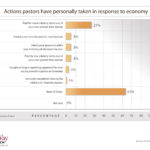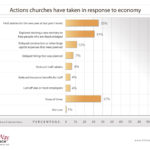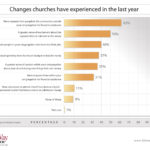NASHVILLE, Tenn. — Protestant churchgoers in America remain generous during difficult economic times, and their churches have increased their ministry to the needy. Despite the country being in an official recession for the past year, giving in 2008 was up an average of 4 percent over 2007 according to a survey of 1,000 Protestant pastors by Lifeway Research.
“While many sectors of the economy have taken a clear step back in the last year, Protestant churches have held their own,” said Ed Stetzer, vice president of Lifeway Research and Ministry Development.
Still, more than half of pastors interviewed say that the current economy is negatively impacting their churches, but only 7 percent of Protestant pastors say the economy is “very negatively” impacting their churches. Thirty percent of pastors say the economy has had no impact on their churches.
Lifeway Research surveyed 1,000 Protestant pastors during February 2009. Respondents were asked how the economy is impacting their churches, how giving levels compare to budget, how 2008 offering totals differed from 2007, and what changes have taken place in their churches as a result of the economy.
The average church saw offerings grow by 4 percent in 2008. Growth in offerings of 10 percent or more was experienced by 26 percent of churches. In contrast, 12 percent of churches saw their giving decline by 10 percent or more in 2008.
Pastors are almost as likely to report giving ahead of current budget as behind it. The largest group of churches (45 percent) report offerings since the beginning of 2008 have been about what they budgeted. Twenty-six percent of churches are receiving more than they budgeted and 27 percent are receiving less. Two percent of pastors are not sure. Seventy-one percent of Protestant churches around the country are either meeting or exceeding their budget, according to the survey.
“While the public’s faith in almost every other type of investment has crumbled, faithful givers continue to support churches,” noted Scott McConnell, associate director of Lifeway Research. “If current trends continue, the majority of churches will likely meet their budgets this year.”
Making adjustments
Because of the financial crunch, 35 percent of churches held salaries for the new year at last year’s levels and 12 percent delayed construction or other large capital expenses that were planned. Still, 31 percent of churches explored starting a new ministry to help people who are disadvantaged and 37 percent increased spending from the church budget to help the needy.
Churches willing to meet financial needs will almost certainly find increased opportunities to do so, according to the survey. A majority (62 percent) of churches have had more people in the community request financial assistance in the last year than in previous years.
“When times are tough, the church can be at its best – being, doing and telling the good news of the Gospel,” Stetzer said. “Though the church has not been hit as hard as many sectors of society, the data is showing some real challenges. Churches are having to be much more cautious with their spending.”
Even within congregations, needs increased. Nearly a third (31 percent) of churches have received more requests from within the congregation for financial assistance in the last year than in previous years. Within the last year, 4 in 10 churches have had more people than normal within the congregation lose their jobs.
This last year has also brought changes in how those within congregations approach expenditures. Thirty-five percent of churches have a heightened sense of caution within their congregations about trying new things that cost money. A small number of congregations (11 percent) have seen increased reluctance to attend church functions or church-sponsored events that carry a cost or admission charge.
Among the other effects the economy has had on churches:
- Seven percent delayed hiring that was planned.
- Six percent reduced staff salaries.
- Four percent laid off one or more employees.
- Four percent reduced insurance benefits for staff.
Some pastors have made personal sacrifices to continue ministering in the slumping economy. Twenty-seven percent have paid for ministry items out of their own pockets more often than normal. That figure jumps to 34 percent among pastors whose salaries held at last year’s level and to 55 percent among pastors with reduced salaries. Only five percent have paid fewer ministry expenses out of their own pocket than normal.
In rare cases, ministers have supplemented their incomes to make ends meet. Five percent recently added a non-ministry job for more income. Five percent of pastors have asked their spouses to add a non-ministry job for more income. Three percent of pastors have sought writing or speaking opportunities that provide royalties or honoraria.
Only 1 percent of pastors have seriously considered leaving the ministry for financial reasons during the economic slowdown.
“It’s easy to hunker down with what money you have left,” McConnell said. “Yet Jesus Christ told his followers that giving out of your poverty is worth far more than giving out of your surplus. Pastors are living this truth. They are choosing 5-to-1 to give more out of their own pockets, rather than less, to ministry opportunities.”
Footnotes
Methodology: Pastors were asked to look back to a common starting point in order to compensate for various budget cycles – for this question it was the beginning of 2008.










